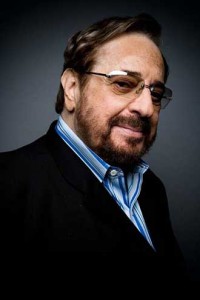
Phil Ramone has embraced change, from 45s to downloads
By Chris Chipello
Phil Ramone, one of the recording industry’s most prolific and celebrated producers, has this message for those trying to counter the online-music revolution: “People shouldn’t resist change; it’s OK.”
“As I’ve tried to explain to record companies, it’s not nice that you sue our customer – and arrest my grandmother for copying (music) for her grandchild,” he said in a mini-Beatty lecture Monday at the Schulich School of Music. “You don’t do that. You rethink about how it would be to have you wonderful people hear the music we work with – hear it in full surround, see it in HD, or better, 3D.”
The Internet is “the new paradigm,” Ramone said. “I don’t believe records should cost a lot of money.”
Since he began recording artists such as Lesley Gore and Peter, Paul and Mary in the 1960s, Ramone has seen plenty of new technology come along – and helped pioneer the use of much of it. He produced the first CD ever pressed, Billy Joel’s 52nd Street. The first pop DVD release, Dave Grusin Presents West Side Story, was his production. He used a fiber-optics system to record tracks from different locations for Frank Sinatra’s groundbreaking Duets I and II albums.
Over the past four decades, Ramone has won 14 Grammy awards. A sampling: in 1964, Best Engineered Recording (non- classical) for Getz/Gilbert; in 1975, Producer of the Album of the Year, Paul Simon’s Still Crazy After All These Years; in 2004, a Technical Grammy for contributions of outstanding technical significance to the recording field; in 2005, Producer of Best Surround Sound Album, Ray Charles Genius Loves Company; in 2006, Producer of Best Traditional Pop Vocal Album, Tony Bennett Duets: An American Classic.
After childhood training at Juilliard as a violinist, Ramone found himself chafing at the constraints of classical music. He began playing jazz. He also became fascinated with sound technology. Producing music combined those talents and interests – along with a knack for tuning into performers’ aspirations. His career has included collaborations with a remarkable array of popular artists, from Burt Bacharach and Bob Dylan to Ray Charles and Luciano Pavarotti.
Early on, he had a hand in making commercials for companies such as Pepsi and Hertz. (Readers of a certain age will recall the “Let Hertz put you in the driver’s seat” campaign.) That led to another big break, when one of his contacts invited him to help with a gala for President John F. Kennedy. More high-profile gigs followed, including the famous Marilyn Monroe performance at JFK’s birthday party in Madison Square Garden.
Many years later, his reputation well established, Ramone suggested to Sinatra that he record some duets. Sinatra, then in his mid-70s, balked. But he eventually relented, on one condition: that he would be in a different studio than his duet partners, so neither would be too embarrassed if the performance didn’t work out. “It’s gonna be great,” Ramone assured him at one point. To which Sinatra replied, “It better be, kid.” The record ended up selling millions of copies.
Ramone’s current projects include an album by Montreal teenage jazz vocalist Nikki Yanofsky and a television documentary, produced with Quincy Jones, on the history of the recording industry.
In 2009, the online revolution marks “a new beginning,” Ramone said. “I’m not here to preach about iTunes or anything else. I just think we need to remember that our children, and your children’s children, need to be introduced to the best sound in the world…
“As Quincy Jones said: If you turned off the music for 24 hours, the world would go crazy.”
